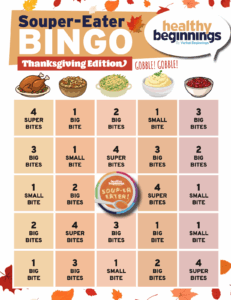By Ben Sarcia, Director of Healthy Beginnings at Verbal Beginnings

For so many caregivers, the Thanksgiving dinner is one of anticipation. This includes excitement and dread. As a father of two, I typically try to balance my responsibilities of keeping the fireplace roaring while attempting to perfectly execute recipes that I prepare only one time per year. At the end of this ritual, we typically sit down at the dining room table, which allows the opportunity for my children to offer their objections to this dinner.
I get it. It’s a lot of brown, seasoned food, cooked soft.
At least the beans are green, though I add a layer of crunchy onions, which have been cooked soft too, and some cream of mushroom soup to increase brown content to an otherwise attractive vegetable.
On a normal day, my kids eat pretty well. But not this dinner.
Each year, the day after Thanksgiving leads to an influx of calls or e-mails to my feeding therapy program. I always wonder, “what was the breaking point?” Was it just too much brown food? Did the child make a scene in front of a great aunt or was it that all of the cousins at least tried their green bean casserole? Over the course of the year, I meet plenty of children that are malnourished due to food selectivity. However, I also meet plenty who are completely healthy.
Yet, family gatherings, holidays, and even birthday parties can result in discomfort.
“I just want my kid to eat pizza at the party, like the other kids. I don’t want to bring his chips,” one parent said to me recently. This frustration represents the social difficulty associated with food selectivity. Therefore, this illustrates a need to address food selectivity not just for health reasons, but for caregiver stress, and for social engagement.

I put together this bingo board as a potentially fun way to encourage any child (or adult) to try unfamiliar foods at Thanksgiving dinner. Caregivers can customize what the bingo winner receives! It could be stickers, or a treat, perhaps even time to watch a special movie. Even if bingo is not achieved, caregivers can give attention to accomplishments on the board! This positive attention can build confidence, a reward that is anticipated to last much longer than a sticker.
Click below to download to print out Souper-Eater Bingo, Thanksgiving Edition. And if we can help answer your questions or talk more about how our feeding therapy program works, I’d love that too.
From all of us at Verbal Beginnings, Happy Thanksgiving!
DOWNLOAD PRINTABLE PDF








